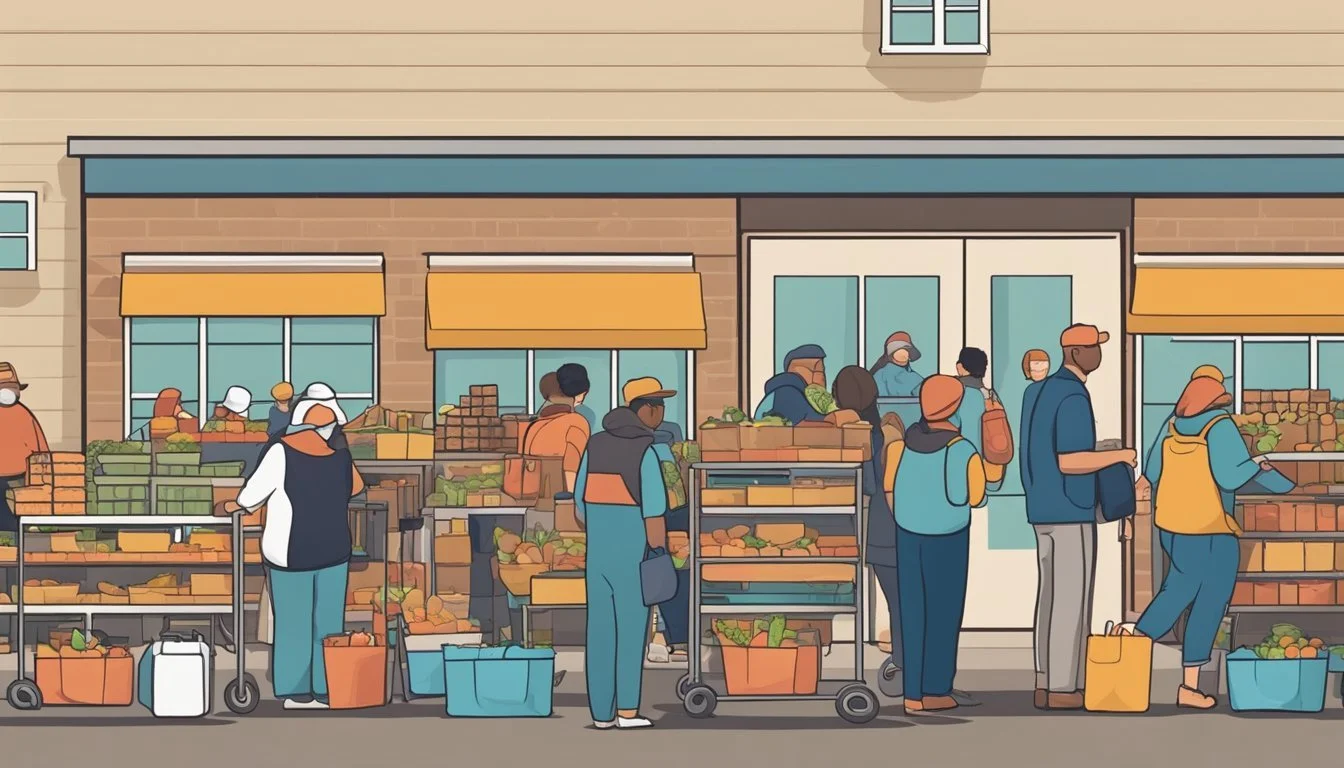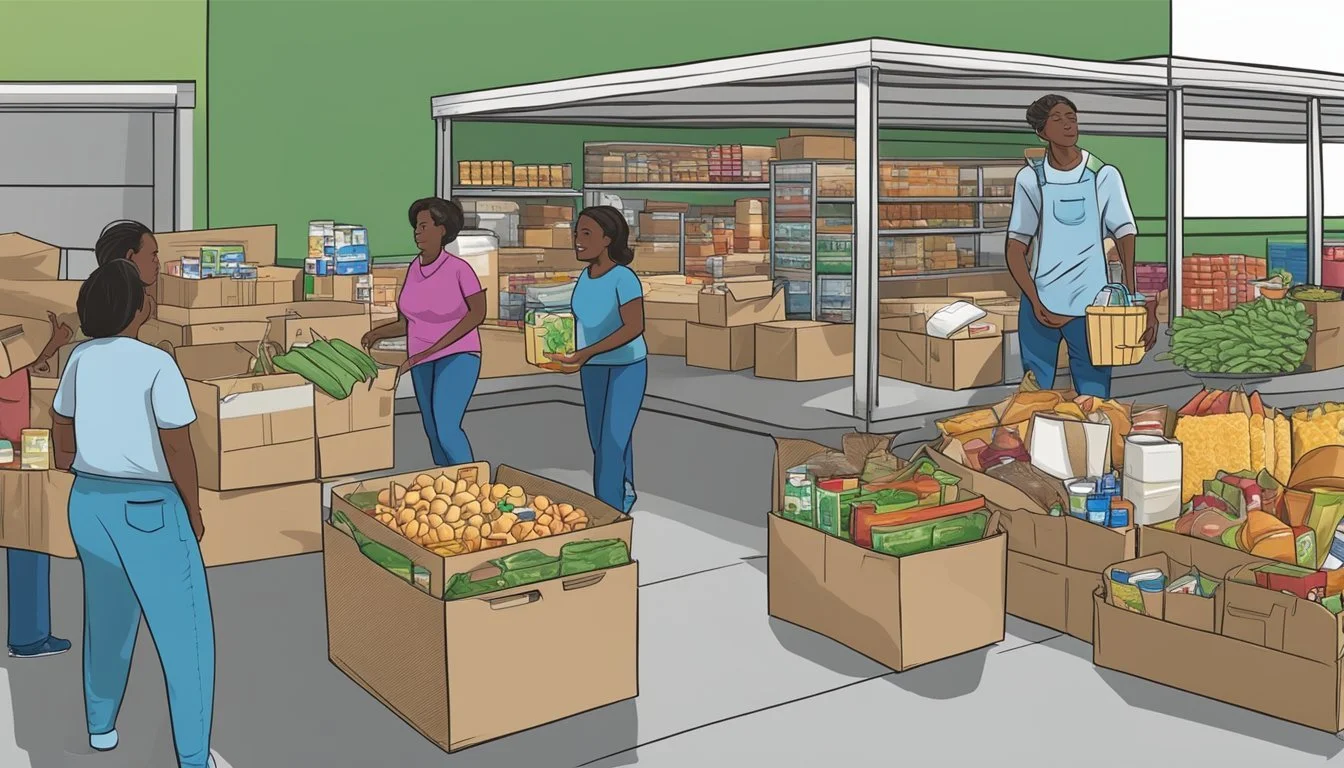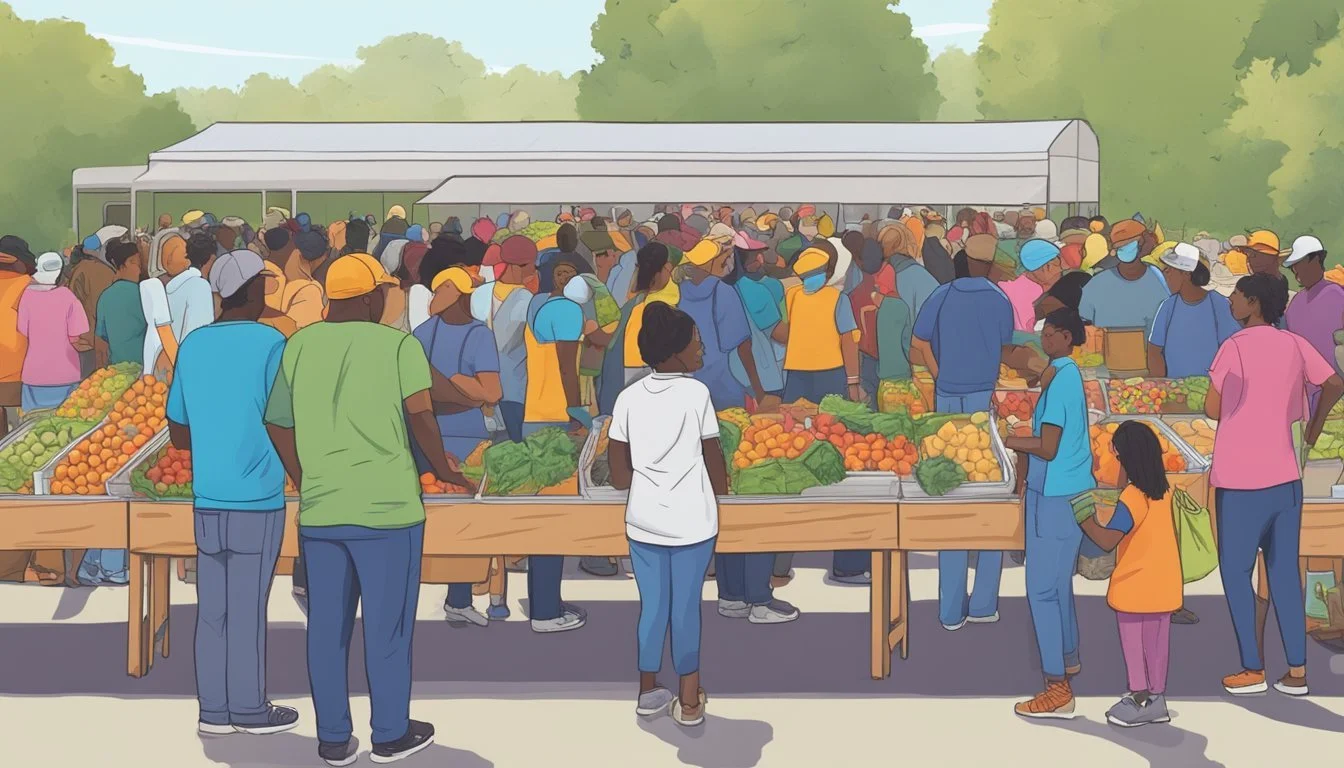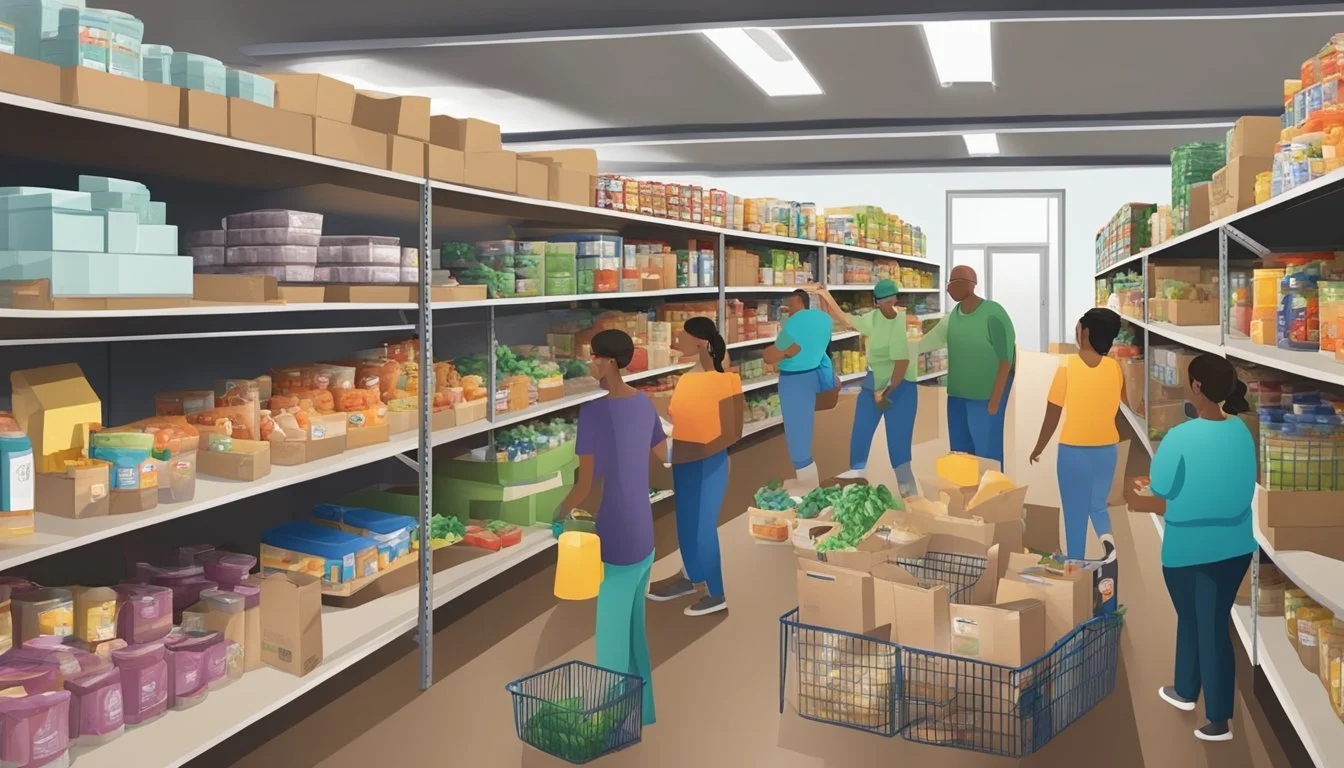Free Groceries and Food Pantries in Madison County, Texas
Your Guide to Local Assistance Programs
This Article is Part of Our Guide on Free Groceries in Texas
Madison County, Texas offers a vital network of free groceries and food pantries designed to support residents facing food insecurity. These services provide essential nutritional assistance, ensuring that individuals and families have access to the sustenance they require. With a range of locations and programs, the food pantries operate to not only offer immediate relief in the form of food supplies but also to foster a sense of community support.
Each food pantry in the county operates with specific hours, catering to the diverse schedules of the community. They are strategically located to be accessible, making sure that help is never too far away. The provision of free groceries is handled with respect and confidentiality, often with minimal eligibility requirements, to streamline the assistance process.
Organizations such as the Brazos Valley Food Bank and various local pantries in the county are part of a larger commitment among several counties to alleviate hunger. They are closely connected with national organizations such as Feeding America, which play a crucial role in resources distribution and support. Madison County's residents can find solace in these food assistance programs, which are ready to serve with compassion and efficiency.
Understanding Food Insecurity
In Madison County, Texas, food insecurity has proven to be a persistent challenge exacerbated by economic stressors and health crises. It reflects the struggle many individuals and families face in accessing sufficient and nutritious food on a regular basis.
Impacts of Covid-19 on Food Access
The COVID-19 pandemic disrupted supply chains and increased unemployment, significantly affecting the community's access to food. Many residents found it more difficult to afford groceries due to lost income or increased expenses. In response, community efforts coalesced to support those in need with increased reliance on food banks and pantries.
The Role of Food Banks and Pantries
Food banks and pantries in Madison County serve as critical lifelines for those impacted by food insecurity. During the pandemic, these institutions witnessed a sharp rise in demand, distributing essential food to a growing number of individuals and families. By sourcing and giving away free groceries, they work to alleviate the immediate pressures of hunger within the community.
Local Food Assistance Resources
In Madison County, Texas, residents in need can access a variety of food assistance programs. These resources range from food pantries that offer groceries to soup kitchens providing hot meals, as well as emergency food assistance services ensuring urgent needs are met.
Madison County Food Pantry List
Madison County Food Pantries offer a range of non-perishable groceries, fresh produce, and sometimes personal care items. Residents can visit these pantries during operational hours to receive food supplies.
Madisonville Care Center Food Pantry
Address: 411 West Trinity Street, Madisonville, TX
Phone: (936) 348-5282
Hours: Tuesday & Thursday, 9:00 am - 2:00 pm
Son-Shine Outreach Center
Address: 401 South Madison Street, Madisonville, TX
Phone: (936) 348-5282
Hours: Monday - Friday, 8:30 am - 3:00 pm
Soup Kitchens and Free Meal Programs
Soup Kitchens in Madison County provide immediate nourishment to those facing hunger through free hot meals in a communal setting. These are critical in feeding the homeless and low-income individuals.
Madisonville Soup Kitchen
Location: To be confirmed with local sources
Typical hours: Operates during lunch hours on weekdays
Bear in mind that exact locations and hours of operation for soup kitchens may change, and it is advisable to contact local authorities or community centers for the most current information.
Emergency Food Assistance
In times of crisis, Emergency Food Assistance is crucial. Madison County has systems in place to aid those who find themselves in sudden need due to events like job loss, natural disasters, or other emergencies.
Emergency Food Assistance Program (TEFAP)
Offers: Temporary emergency food assistance to eligible low-income families
Contact: Local TEFAP agencies in Madison County through the Texas Health and Human Services website.
Emergency Food Boxes
Typically provided by local food pantries or charitable organizations
Availability: Depends on the resources and donations received by these entities
These resources are designed to ensure that no resident in Madison County has to face food insecurity alone.
Government and Non-Profit Support
Madison County, Texas, benefits from an extensive support network focused on addressing food insecurity through various federal, state, and local initiatives as well as non-profit organizations.
Federal and State Assistance Programs
SNAP, also known as the Supplemental Nutrition Assistance Program, offers nutritional assistance to eligible low-income individuals and families via an EBT card that can be used like a debit card to purchase eligible food items. The WIC program, or Women, Infants, and Children, provides federal grants to states for supplemental foods, health care referrals, and nutrition education for low-income pregnant, breastfeeding, and non-breastfeeding postpartum women, and to infants and children up to age five who are found to be at nutritional risk.
Local Non-Profit Organizations
Non-profit groups including Feeding America, a nationwide network of more than 200 food banks, play a pivotal role in Madison County by distributing food through local food pantries, soup kitchens, and mobile pantries. These organizations rely on donations and volunteers to operate and often collaborate with local businesses and government agencies to maximize their reach.
Community Outreach Centers
In Madison County, community outreach centers act as hubs for not only food distribution but also for connecting residents with resources and assistance programs. These centers often hold events such as free grocery giveaways and offer services that include help with SNAP benefit applications, aiming to ensure that assistance is accessible to those in need.
Additional Services and Support
Madison County, Texas, offers a comprehensive set of services aimed at not only providing immediate food assistance but also fostering long-term nutritional education and support for families and vulnerable individuals. These programs are designed to meet diverse needs, from emergency food aid to educational outreach.
Nutritional Programs for Families
Families in Madison County can access nutritional programs that provide a steady supply of healthful foods to promote balanced diets. These programs often include nutritional education, helping parents make informed choices about their family's meals. For households with young children, assistance may extend to providing diapers and baby formula, ensuring the health of infants and toddlers.
Specialized Food Services for Vulnerable Groups
Specialized food services are in place to cater to the needs of the community's most vulnerable groups. This includes seniors, disabled individuals, and those with specific dietary constraints. Organizations in Madison County may offer meal delivery services and mobile pantries, enabling access to nutritious foods for those who might otherwise find it challenging to obtain them.
Education and Advocacy Groups
Education plays a pivotal role in addressing food insecurity sustainably. In Madison County, various advocacy groups focus on educating individuals about food resources and how to access them. They may conduct workshops, provide literature, and offer one-on-one counseling. For students, partnerships with schools ensure that educational programs about healthy eating habits are an integral part of the curriculum, fostering awareness from an early age.
Participating in Food Distribution
Participating in food distribution efforts in Madison County, Texas, involves a coordinated approach where local food banks, community volunteers, and organized food drives play crucial roles. These efforts ensure that those in need have access to essential food supplies.
Volunteering at Local Pantries
Local pantries largely depend on volunteers to operate efficiently. Individuals can assist with sorting and packaging food, managing inventory, and distributing groceries to community members. Madison County Food Bank is a prime example where volunteers are essential for their weekly distribution schedules.
Organizing Community Food Drives
Community food drives are pivotal in replenishing the stocks of local food banks. Civic organizations, schools, and businesses can organize these events, encouraging participants to donate non-perishable food items. The collected food supports the ongoing supply at food distribution points across Madison County.
Contributing to Food Distribution Efforts
Contributions to food distribution aren't limited to physical food donations or volunteering time. Monetary donations are equally significant, as they provide the flexibility to purchase specific items in need. Furthermore, raising awareness and advocating for food security initiatives is a valuable contribution to the community's collective effort to address hunger in Madison County.
Finding Food Assistance Nearby
Those in need of food assistance in Madison County, Texas have several reliable options. Utilizing zip codes for search, taking advantage of drive-thru pantries, and accessing resourceful maps, residents can find the necessary support efficiently.
Using Zip Code to Locate Pantries
Individuals can find nearby food pantries by entering their zip code on local food bank websites or national directories like Feeding America. This method quickly filters the available resources within the vicinity, making the search for assistance targeted and direct.
Mobile and Drive-thru Pantries
Drive-thru pantries provide a convenient way to receive groceries without leaving the car, maintaining privacy and reducing the time spent on food collection. These services are often scheduled throughout Madison County and provide considerable relief for those unable to access traditional pantries.
Accessing Food Assistance Maps
Online maps are available that detail food assistance locations across Madison County. These tools allow users to visualize and plan their visit to the available food resources, including pantries and mobile distributions, ensuring they can access food with minimal hassle.
How to Get Help
Navigating the landscape of food assistance in Madison County, Texas, can be straightforward when one knows where to look and what steps to take. This section provides residents with clear information on determining eligibility for free groceries, the procedures to obtain food assistance, and essential contact details for immediate support.
Identifying Eligibility for Free Groceries
Eligibility criteria for food assistance programs often include factors like household income, size, and financial need. Residents can determine their eligibility for programs like FoodShare by contacting the local food assistance helpline. Most programs follow federal income guidelines, and some may require proof of residency in Madison County.
Steps to Receive Food Assistance
To receive food assistance, individuals typically need to:
Check Eligibility: Refer to the income guidelines provided by the programs.
Find Local Pantries: Use online resources or community bulletins to locate nearby food pantries.
Apply for Programs: Complete an application for FoodShare or similar programs using a 'Wisconsin Quest' debit card.
Visit Pantries: Attend the food pantries during their operational hours for immediate assistance.
Contact Information for Immediate Support
Immediate support can be accessed through the following contact information:
Food Assistance Helpline: For guidance and applying for FoodShare, reach out to the helpline at 1-877-366-3635.
Local Food Pantries: Contact nearby pantries such as Bethel's Food Pantry at (608) 257-3577 or The River Food Pantry at (608) 422-8815 during their service hours.
Online Resources: Websites like findhelp.org provide directories of local food assistance services.
Residents with immediate food security concerns are encouraged to utilize these avenues to find the support they need in a timely manner.







